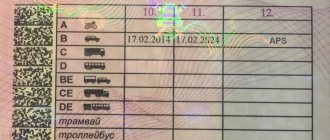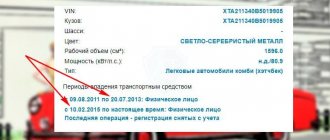Types of documents, the presence of which confirms a citizen’s property claims to a vehicle
The legislation of the Russian Federation establishes documents certifying a citizen’s ownership of a vehicle in his possession. First of all, correctly concluded agreements act in this capacity:
- purchase and sale;
- exchange;
- donation;
- rent;
- other transactions carried out within the framework of the Civil Code.
Ownership of the vehicle is also confirmed by a paper issued by the social security authority on the provision of a means of transportation to a disabled person. In cases where the owner's property claims arise as a result of legal proceedings, the legal document will be a court decision or court order.
Inheritance can also be the basis for acquiring ownership of a vehicle. In this case, a certificate confirming the citizen’s acceptance of the inheritance certifies the person’s property claims.
Also, documents confirming the title can be a certificate-invoice and a decision of a local government body recognizing the owner of a vehicle recognized as a find.
The above documents confirming the ownership of the car are title deeds. According to the law, direct ownership of the vehicle occurs at the time of its transfer under the contract, except for cases specifically stated in the contract or law. However, it should be noted that a transaction with a vehicle must undergo the registration procedure with government agencies and only then the citizen purchasing the car becomes its legal owner.
The transfer of ownership is confirmed by a certificate of registration. To complete this procedure, no driving experience is required, since the owner of the vehicle may be a person who does not have a driver’s license. To obtain a certificate and register a vehicle, you must provide one of the above documents to the territorial traffic police department.
Most often, property claims to transport are established on the basis of a purchase and sale agreement, since vehicles are purchased by citizens privately or at car dealerships. The fact of ownership can also be confirmed by an act of acceptance and transfer of the vehicle. It should contain the following information:
- Information about the buyer and seller (last name, first name, patronymic, registration address, place of registration of the legal entity);
- Vehicle data (model, make, identification number, color, etc.);
- All identified defects of the car (chips, scratches, incomplete equipment, etc.).
When an individual acts as a buyer, the seller can limit itself to only issuing a bill of lading. You should know that although an invoice can confirm the fact of transfer of ownership to a person, it is better to use the transfer and acceptance act as a document confirming title. Therefore, it is necessary to request the execution of the act from the seller.
We invite you to familiarize yourself with: Renting an apartment with the right to later purchase or leasing? 2021
The vehicle passport, certified by the State Traffic Safety Inspectorate, contains a note about the owner, but is not legal and does not confirm the transfer of ownership of the vehicle. According to the law, it is only a registration paper.
These, as it turned out, important questions were answered by the Supreme Court in its review of judicial practice. These are, in fact, specific recommendations for all other courts on how to make decisions in similar situations.
Some insurance companies, as well as some judges, as it turned out, do not know from what moment ownership of movable property, that is, a car, begins. As a result, the former refuse to pay after an accident, and the latter support them in their delusions.
So, in April 2014, an accident occurred in Rostov-on-Don. Zaitseva's driver crashed into Chekhov's car. Experts estimated the damage at 105 thousand rubles. However, the insurance company responsible for the accident refused to pay. She referred to the fact that the car allegedly did not belong to Chekhov. According to the vehicle passport, as well as the registration certificate, the car is registered with the traffic police for another person.
In general, insurers are more than willing to make excuses to avoid paying bills. However, the court of first instance confirmed the validity of their claims. The appellate court also supported him. Like, they didn’t deregister the car, they didn’t put it on a new one, under Chekhov. And therefore it does not belong to Chekhov, despite the fact that he paid money for it and received ownership of it in accordance with the purchase and sale agreement and the transfer and acceptance certificate.
However, the Supreme Court did not agree with this decision. In accordance with paragraph 2 of Article 218 of the Civil Code of the Russian Federation, ownership of property can be acquired by another person on the basis of a purchase and sale agreement, exchange, donation or other transaction for the alienation of this property. According to the general rule, enshrined in paragraph 1 of Article 223 of the Civil Code of the Russian Federation, the moment of emergence of the ownership right of the acquirer of a thing under an agreement is the moment of its transfer, unless otherwise provided by law or agreement.
Other is real estate. Ownership in this case is subject to state registration. And only after this procedure, having received the appropriate document, the owner becomes the full owner. But real estate includes land plots, subsoil plots and everything that is firmly connected to the land, that is, objects whose movement without disproportionate damage to their purpose is impossible, including buildings, structures, and unfinished construction projects.
We invite you to read: Is it possible to lease land from the state and how to do it?
By the way, immovable property also includes aircraft and sea vessels, as well as inland navigation vessels. They are also subject to state registration.
However, cars, motorcycles, etc. are classified as movable property. State registration of rights does not apply to them. Registration of vehicles is of an accounting nature and does not serve as a basis for the emergence of ownership rights to them. That is, without registration, a car cannot drive on public roads.
The Civil Code of the Russian Federation and other federal laws do not contain rules limiting the powers of the owner to dispose of a vehicle in cases where this vehicle has not been deregistered by him. There are no provisions in the legislation that state that a new purchaser of a vehicle under a contract does not have ownership rights to it if the previous owner has not deregistered it.
And who the car is registered in the traffic police should not bother anyone except the previous owner. The courts did not take all this into account. Therefore, the Supreme Court returned the case for a new trial to the appellate court so that the decision could be made with new inputs.
It must be said that the owner of the car is obliged to register the car with the traffic police within 10 days. Owning a car comes with certain responsibilities. At least for paying vehicle tax. It doesn’t matter whether it is used or not.
At the same time, the tax office, as well as the traffic police, consider the purchase and sale agreement and the acceptance certificate as documents that confirm the transfer of ownership. But for some reason the insurers don’t.
Data about the owner of the car is contained in documents such as PTS, STS, insurance policy, as well as a purchase and sale agreement (donation or exchange) and other documents.
Which of the following documents confirms ownership of the car, and which of them confirm the fact of ownership?
What is the object and subject of ownership in relation to vehicles?
- A subject is an individual or legal entity who owns, uses and disposes of a car. It can be a person, a group of people, a work team, a social group.
- Object – a vehicle owned by a subject by right of ownership. In accordance with the Civil Code of the Russian Federation, a car is defined as a movable thing and is the object of civil legal relations.
Reference. According to
Article 130 of the Civil Code of the Russian Federation
all things can be classified into two categories: movable (point 1) and immovable (point 2).
- Real estate is considered to be those that cannot be moved without significantly changing their purpose (objects inextricably linked to the land, ships subject to state registration).
- All objects that are not classified as real estate are considered movable property. Therefore, a car is movable property.
By subject, ownership of a car can be classified into the following types:
- Private – the owner acts with the vehicle at his own discretion, without coordinating his actions with anyone.
The right to a car in this case may belong to an individual, a legal entity, or a group as a single entity. Private property can be considered any non-state form, including individual, joint stock, and corporate. - State - a car can belong to the state either entirely or on the basis of joint or shared ownership.
The machine is assigned to a government agency or enterprise, which receives the right to dispose of it in accordance with Articles 294, 296 of the Civil Code of the Russian Federation. Property rights and obligations in this case are exercised by public authorities (Article 125 of the Civil Code of the Russian Federation). - Property of subjects of the federation - in accordance with Article 26.11 of the Law of October 6, 1999 No. 184-FZ, a subject of the Russian Federation may own property that is necessary to ensure its activities and exercise its powers, including cars. Based on Article 214 of the Civil Code of the Russian Federation, such property is considered state property.
- Municipal is a property complex of a certain populated area, which includes movable property, including vehicles. Local government bodies manage this property (Article 125 of the Civil Code of the Russian Federation).
- Combined - this variety arises in the case of combining several types while maintaining such volumes of powers that make it possible not to lose the basic properties of each subject.
Enterprises included in these associations retain their original forms of ownership. That is, the car may belong to one of the companies of the concern, since by coordinating each other’s activities, the enterprises do not merge. - Mixed - a vehicle as an object of property belongs to an entity that combines the features of several types, the powers of which are intertwined.
- Joint stock is a type with unevenly distributed rights, which, in terms of the composition of its subjects, is both combined and mixed. In this case, the vehicle may belong to only a part of the subjects, and with different ratios of rights.
Transfer of ownership of a car
The transfer of ownership of a car occurs at the moment of concluding a sales contract and the seller receives funds, the amount of which is specified in the contract. It is best to conclude an agreement with a notary - this method is the easiest and fastest. After this, the new owner of the car must deregister it himself and carry out all the necessary manipulations related to registration in his name.
Advice from Sravni.ru: when purchasing a car, you receive a package of ownership documents. If the purchase is made from a private person, conclude the purchase and sale transaction with a notary - this will protect you from fraud.
Documents confirming and certifying ownership
To understand this issue in detail, it is necessary to separate the concepts:
- document confirming ownership;
- document certifying ownership.
Documents issued by traffic police departments, customs, and insurance organizations refer to documents confirming ownership:
- PTS (vehicle passport) is a document containing information about the main technical characteristics of the car, information about the owner, registration and deregistration.
- STS (vehicle certificate) is a document confirming that a vehicle has been registered and registered.
- OSAGO (compulsory motor third party liability insurance policy) – insurance of property interests associated with the risk of civil liability of the vehicle owner for obligations arising from harm to the life, health or property of victims when using the vehicle.
We suggest you read: How long does it take for Rosreestr to register property rights?
All of the above documents contain information about the owner of the vehicle. And all these documents confirm the fact of ownership of the car, i.e. are documents confirming ownership. However, the emergence of ownership occurs even before the data is entered into the specified documents.
From what moment does it arise?
When does ownership arise and the car becomes owned? The moment of ownership of a car arises:
Its transfer from the seller to the buyer upon the transfer of the goods (Article 223 of the Civil Code of the Russian Federation).- After drawing up the relevant agreement (sale, donation or other procedure for the alienation of property) - Art. 218 of the Civil Code of the Russian Federation.
- If the purchase and sale agreement states that only after full payment for the car the buyer will become its owner, then he will first have to pay for the purchase and only after that can he consider himself the full owner.
The parties to the transaction, by agreement, choose the most convenient option for themselves.
Registration of a vehicle is not the basis for the emergence of ownership rights, since it can only arise on the basis of a purchase and sale agreement, gift, exchange or other transaction for the alienation of property (Article 218 of the Civil Code of the Russian Federation).
Types depending on the number of owners
Important! Forms of ownership can also be classified depending on the number of entities that own the car.
Usually, particular and general forms are considered.
We invite you to read: The employer did not pay wages in Poland: where can a Ukrainian complain and how to collect the money he earned?
Private
This type assumes that the vehicle has only one owner. He has the right to dispose of, own, and use his car.
The right of common ownership of a car appears in the case when the car belongs to two or more persons (Article 244 of the Civil Code of the Russian Federation). Moreover, all subjects together have the right to own a vehicle, but theoretically, each person’s share in it can be distinguished.
Restrictions on the right arising from the presence of several owners are mainly associated with the need to provide the opportunity for pre-emptive purchase to the co-owners of the car.
Property that belongs simultaneously to several entities is called common property if it cannot be divided in such a way as to preserve its original purpose, or it is prohibited by law from being divided.
Possession of the right of ownership of an indivisible thing can be either joint or with a determination of the ratio of the rights of all subjects to dispose of it. Consequently, ownership of a car as a thing not subject to division can be of the following types:
- Share. This type involves determining the shares of each of the subjects. For example, if a car is inherited by three heirs, then the share of each of them will be 1/3 of the right to the vehicle.
- Joint. This type of ownership is possible if the law does not provide for the allocation of shares. For example, property of spouses acquired during marriage.








